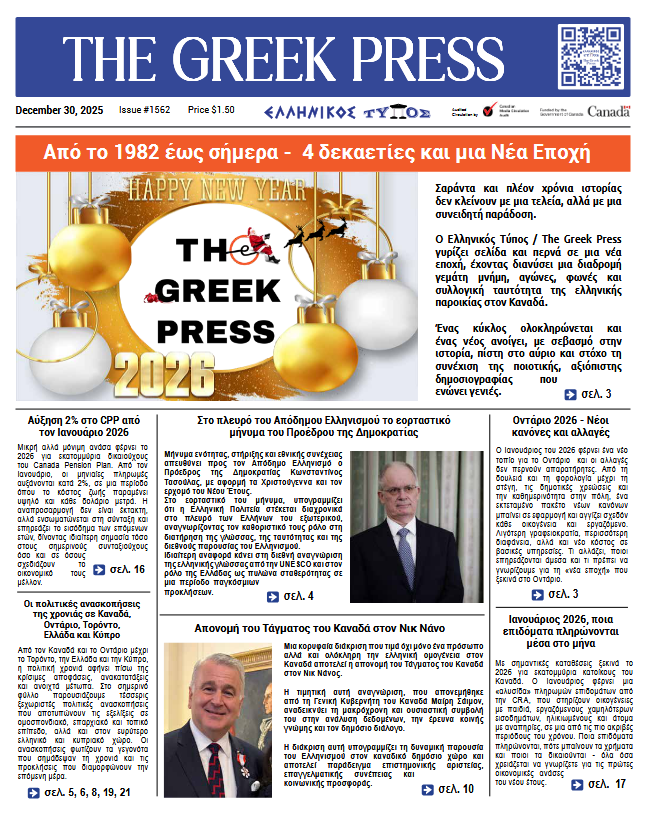 CLICK TO VIEW THE WHOLE PUBLICATION ONLINE
CLICK TO VIEW THE WHOLE PUBLICATION ONLINEFr. Theodoros Zisis
Every year on the feast of the Epiphany or the Lights, after the Divine Liturgy and the Great Consecration, we are accustomed to wishing one another «Καλὴ Φώτιση» “Good Enlightenment,” even those who are unaware of the meaning of the prayer. But what is good enlightenment? Is there also bad enlightenment, which is hidden under the prayer for good enlightenment, and is essentially darkness? Did not the same thing happen with the famous European Enlightenment, which turned out to be European Darkness?
Good enlightenment is Christ and Orthodoxy; bad is Ecumenism and Secularization. The disappointing and distressing thing is that many, especially baptized Christians, and worse, bishops and patriarchs, deny with their lives and teachings that the Light has come into the world. They are bringing back the pre-Christ era of Syngritism, complacency, idolatry, multiculturalism, carnal pleasures and worldly pleasures, plunging humanity back into the deep darkness of evil and sin. Instead of the Bishops helping the politicians and civic leaders become enlightened by the true light of Christ, so that they may govern with “Divine Governance” following the commandments of the Gospel and utilizing the treasures of the Orthodox Tradition, they walk with them in the darkness of antichristian faith and life. And they do not simply walk along, but they sit comfortably in the darkness, without hope of escape and redemption, as Saint John Chrysostom* explains in interpreting the gospel passage from the Holy Gospel of Matthew (4, 12-17), read every year on the Sunday after Epiphany.
In this passage, the Evangelist, relying on a prophecy of the prophet Isaiah, tells us that after His Baptism, Christ made Capernaum,«ἐν ὁρίοις Ζαβουλὼν καὶ Νεφθαλείμ»“in the borders of Zebulun and Naphtali”, the centre of his activity. He characterizes this region as “Galilee of the nations,” because there was a mixture of nations, religions, and cultures there, like the multicultural model and polytheism that political and ecclesiastical leaders of Syngritism, Ecumenism, and Globalization still impose on us today.
The Gospel, therefore, proclaims that this model, this mixing, this blasphemy, this ecumenism of the “Galilee of the nations,” is darkness, from which one emerges only when one comes to the light of Christ: “Land of Zebulun and land of Naphtali, way of the sea beyond the Jordan, Galilee of the nations, the people who sat in darkness saw a great light; and to those who sat in the land and shadow of death, light has dawned on them”. Saint John Chrysostom, interpreting the passage, tells us that the initiative to shine the light of Christ was God’s, because before Christ, humanity had reached the extreme point of spiritual decline. People were accustomed to darkness and did not try to come out, they sat in the darkness, they did not walk in the darkness, because it is one thing to sit and
another to walk; when you walk, there is hope of coming out. And now, unfortunately, humanity, without Christ, sits back in darkness and does not seem able or willing to walk, so as to emerge from the darkness into the light of Christ.
* ”And in the last days, human beings were like before the coming of Christ. For they did not walk in darkness, but sat in darkness; which was a sign that they had no hope of being delivered; for as they knew not whither they went, so they sat, seized by darkness, and were not able to stand up.” (Saint John Chrysostom Homily 14)
ΟΡΘΟΔΟΞΟΣ ΙΕΡΑΠΟΣΤΟΛΙΚΗ
ΑΔΕΛΦΟΤΗΣ “ΜΕΓΑΣ ΑΘΑΝΑΣΙΟΣ”
St. ATHANASIUS ORTHODOX
CHRISTIAN MISSION
ChristianOrthodoxMission@gmail.com
846 Pape Ave. Toronto, Ontario, M4K 3T6, Canada, Tel 647-557- 4923


.png)




























